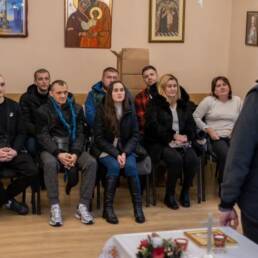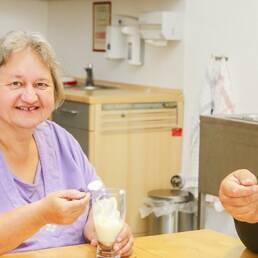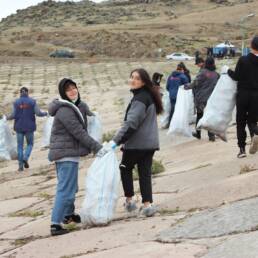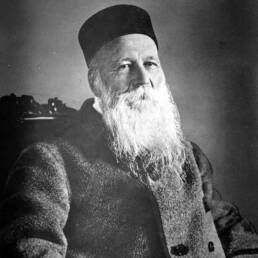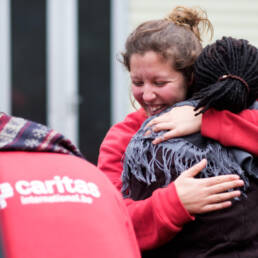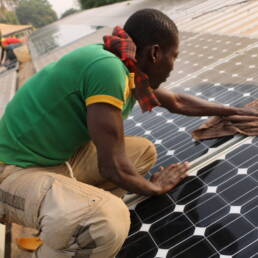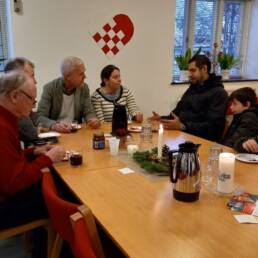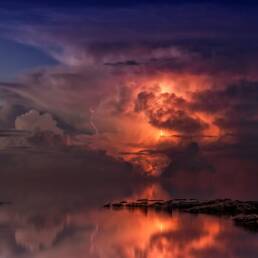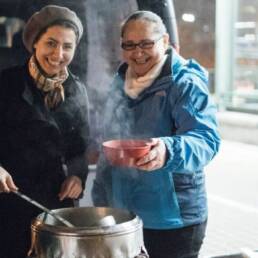Author
Msgr. Michael Landau
President of Caritas Europa
As Christians, every Sunday we gather to celebrate the resurrection of Christ, to be joyful in His triumph. Yet, we find ourselves today in midst of a serious pandemic, and in the largest human created ecological crisis in history.
As Pope Francis writes in Laudato Si’, ‘The earth, our home, is beginning to look more and more like an immense pile of filth.’ (LS 21). The Pope’s message agrees, albeit in more relatable terms, with the widely accepted scientific findings on climate today. ‘Never have we so hurt and mistreated our common home as we have in the last two hundred years.’ (LS 53) How can we as Christians celebrate in a time when things in the world seem so dire?
As an answer – and this is what distinguishes Francis from all doomsday prophets – the Pope knows about the immeasurable power of hope.
Hope would have us recognise that there is always a way out, that we can always redirect our steps, that we can always do something to solve our problems.
Pope Francis, Laudato Si’ 61
Hope is also why we as church, together with all people of good will, root ourselves in a trust for a better world. We believe we can, and want to, leave this world a better place after our we’re gone. Despite all the negative, disturbing and harrowing reports about the state of our beautiful, blue and very threatened planet, we find ourselves before a potentially valuable experience. We rest in a promise of which Pope Francis writes: ‘We were conceived in the heart of God, and for this reason: ‘each of us is the result of a thought of God. Each of us is willed, each of us is loved, each of us is necessary.’ (LS 65) Here and in many other places the Pope lives the hope of an alternative to the negative zeitgeist that dominates so many of our sources of information. In the two letters Laudato Si’ and Fratelli Tutti he sketches a wonderful utopia, even more: something like a model of a more just world.
Our future rests on two pillars: Justice and Love. On the one hand, this stands in line with our tradition, in the good space of Catholic Social Teaching, together with all people of good will who share in our mission to build a world which is more just, more humane, and more future-proof. We do this with an attitude of confidence based on faith, an attitude that can and must make us sensitive to the needs of others, and of our planet. As in the story of the Good Samaritan, the message is clear: ‘go and do likewise.’ Confidence that this world, this One Creation, is in God’s hands. We don’t have to redeem the world, that is already done, and the Lord walks with us whatever comes, whatever happens. But it is up to us, to make this event of God’s love tangible, to make it credible; to translate this single event of redemption, which has happened once and for all, into time and space, here and now.
On the other hand, this message is also highly topical, and relevant to the current debate in society as a whole: if you consider the Sustainable Development Goals, the SDGs, then I think it is exciting and important that we, as church, are involved in the discourse around them, and in their implementation. We have an important voice here as Caritas, as Church: We introduce an image of the human being that reminds us that we are more than a consumer and a producer, an image of the human being that testifies to the equal dignity of every person – from the child with disabilities, to the dying old man.
It is worth recalling that the justice of a society is measured by how it treats the weakest, the most vulnerable within it: the people at the margins of society and life. I think we should also be encouraged from the experience of daily our work: We cannot change everything, but we can change a surprising amount if we want to. This change often begins in small ways, with individual people. It depends on each and every one of us.
The Pope always combines the ecological with the social question. ‘A more responsible overall approach is needed to deal with both problems: the reduction of pollution and the development of poorer countries and regions.’ (LS 175) Just he writes about the ‘mystical meaning to be found in a leaf, in a mountain trail, in a dewdrop, in a poor person’s face,’ he acknowledges that the world can only be saved ‘with a sense of solidarity which is at the same time aware that we live in a common home which God has entrusted to us.’(LS 232). He expresses an awareness of the beauty of nature, and the need to act socially to save it. A Church that, like the Pope, dreams of a less populist, less capital-driven world, but instead, of a world in which all people have their fair share of a good life, where everyone has fair opportunities and where no one is left behind, is at the same time always a Church that must do everything possible to turn these wishes, dreams and visions into a reality. The Pope writes,
No one can face life in isolation… We need a community that supports and helps us, in which we can help one another to keep looking ahead. How important it is to dream together… as a single human family, as fellow travellers sharing the same flesh, as children of the same earth which is our common home (..) , each of us with his or her own voice, brothers and sisters all.
Pope Francis, Fratelli Tutti 8
We are contributing to this, also as Caritas Europa. I am convinced that we as Caritas can also learn from Laudato Si’ and Fratelli tutti – not least in the basic attitude of joy that is expressed in the previous papal letter Evangelii Gaudium that already resonates this dimension of joy in the title. God does not want us small and bent up inside, but upright and straight, with a joyful and wide heart!
As Caritas Europa, we are a learning network. For more than 25 years, since I started as Caritas Director in the Archdiocese of Vienna, I have always found it extremely impressive that in so many places, every day, people are there for others, love is lived, people see a need and act. People stand in solidarity, but also look ahead in confidence.
I am convinced that we will master the path, even if it gets steeper. But for that it is necessary that we stand together and do not forget about the weakest. We stand on a horizon of hope, especially now, in a demanding time. It is the hope based on the experience that many people are ready to be there for others and to get involved and that positive changes are possible and will happen.
But deeper still, it is the horizon of great hope, a horizon which is ultimately God Himself. Our path is in His hands. Of course, we are challenged: this is not a call to do nothing. But I am convinced that with what little we have in our hands, He can accomplish more than we can imagine. He counts on us: here and today.


